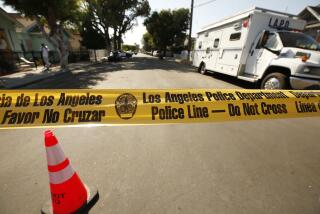Bomb-Sniffing Dog Aids Search at Olympic Guard’s Apartment
- Share via
ATLANTA — FBI agents used a bomb-sniffing dog Wednesday to search the apartment of the security guard who has become a suspect in the bombing at Centennial Olympic Park. Authorities, however, said that Richard Jewell remained one of “a number of suspects” in an investigation that is taking agents throughout Georgia and into other states.
“There are other leads that are being pursued that have nothing to do with him,” one law enforcement source said.
Authorities spent all day Wednesday at Jewell’s apartment looking for evidence that might link him to the bombing. Analyzing material confiscated in the search could take days, authorities said. “People don’t understand--you don’t make a case overnight,” the official said.
Eight people remained hospitalized Wednesday as a result of the pipe bombing, which killed a Georgia woman and injured 111 when it exploded during a free concert in the park. A Turkish journalist died of a heart attack while rushing to the scene.
As authorities continued their meticulous search, First Lady Hillary Rodham Clinton visited the park Wednesday morning. She arrived by a side gate to see the flower-strewn site of Saturday’s blast, accompanied by Atlanta Mayor Bill Campbell, Georgia Gov. Zell Miller and Andrew Young, co-chairman of the Atlanta Committee for the Olympic Games. She stood for a few minutes at the scene, then shook hands with people in the crowd, who were kept behind police barriers.
Later, Campbell met with Frank Sartor, the mayor of Sydney, Australia, which will host the 2000 Summer Olympics. In a meeting with reporters, both men acknowledged what Saturday’s blast underscored--that in the future, cities hosting large public events such as the Olympics can no longer take the safety of athletes and spectators for granted.
“All of us around the world are going to have to prepare for terrorism,” Campbell said. “It is an unfortunate but undeniable fact of life today.”
The daylong search of Jewell’s apartment turned into an international sideshow for scores of the more than 4,000 journalists who are in town to cover the Olympic Games and the hundreds more who have arrived since the blast.
As many as 200 still and video cameras were trained on the stairway to the second-floor apartment in a modest, woodsy complex in northeast Atlanta where Jewell, 33, lives with his mother. Agents from the FBI and the Bureau of Alcohol, Tobacco and Firearms came and went, often carrying small items from the apartment to be stored or processed in an ambulance-like vehicle backed up to the building entrance. About noon, the FBI towed away his pickup truck.
Through most of the day, Jewell could be seen sitting on the stairs outside his apartment, talking to federal agents.
As the agents began their search, FBI spokesman David Tubbs cautioned that no inferences should be drawn about Jewell’s guilt or innocence.
“Mr. Jewell has not been placed under arrest and he has not been charged with any crime,” Tubbs told reporters at the apartment. “Neither the issuance of search warrants nor the execution of it constitutes evidence of guilt.”
NBC News had reported Tuesday night that agents were also searching a mountain cabin in northern Georgia that Jewell had once used.
In addition to Jewell, investigators are known to have interviewed members of right-wing militias--including the Gadsden Minutemen in Alabama, who a law enforcement source said had contacted officials with an offer to talk. They also talked to two Texas men about the bombings.
Authorities said information supplied by ex-employers helped lead them to Jewell, a former deputy sheriff and college security guard in North Georgia who had gotten into trouble on previous jobs for alleged overzealousness.
He was arrested in 1990 on charges of impersonating a police officer in Dekalb County and, after pleading guilty, was given 12 months’ probation and ordered to receive a mental evaluation. Under Georgia’s first-offender act, his record was cleared upon successful completion of probation.
He pleaded guilty to arresting two people for public drinking, stating that he was a certified police officer. He carried a 9-millimeter weapon and a pair of handcuffs.
As late as Tuesday morning, Jewell appeared on NBC’s “Today Show,” telling how he had spotted the knapsack containing the bomb and alerted state authorities. A bomb management team, consisting of an FBI agent and ATF agent, quickly reached the scene. The bomb went off as authorities began clearing the area.
While FBI and ATF agents carried on their investigation, questions continued to swirl about the way police had handled a 911 call shortly before the bomb exploded.
Sources said the call, presumedly made by the bomber, was placed at 12:58 a.m. Saturday from a pay phone near the park. A police officer was sent to the location of the call at 1:08 a.m. The bomb management center was being notified of the threat when the device exploded at 1:25 a.m.
Because law enforcement personnel had already been made aware of the bomb, they were evacuating the area. But the identification of Jewell as a suspect raises the possibility that the pipe bomb was not a terrorist act intended to take lives, as authorities at first assumed.
Because of his alleged history of overzealous police work, Jewell may fit the profile of a person suffering from “false hero syndrome,” said Brian Levin, a criminal justice professor at Stockton College in New Jersey.
If such were the case, the motivation for planting the bomb may not have been to take lives but merely to set up a situation in which he could save the day. In such a scenario, Levin said, the police dispatcher’s delay in notifying the bomb squad that a bomb was allegedly set to go off in 30 minutes could have made a crucial difference.
Police--while insisting that the dispatcher followed established protocol--have not explained what took place during the 10 minutes between when the call was made and the officer was sent.
Associated Press quoted a source who said the dispatcher spent the time looking for an address.
Atlanta Police Chief Beverly Harvard continued to defend her department’s handling of the telephone threat. “I don’t know how much quicker we could have been there,” she said Tuesday during a walk through the park minutes after it reopened. “The question is, was the call mishandled? The call was not mishandled.”
Harrison is a Times staff writer and Clary is a special correspondent.
* MEDIA FRENZY: Shards of circumstantial evidence fuel Atlanta media blitz, Howard Rosenberg says. F1
More to Read
Sign up for Essential California
The most important California stories and recommendations in your inbox every morning.
You may occasionally receive promotional content from the Los Angeles Times.













